In Paris, the Chilean researcher, novelist and feminist Ana (Nicha) Vazquez Bronfman had died, aged 71. She was a beacon for a generation of Latin American women for her insights on identity and gender. One [...]]]>
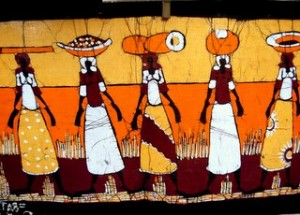
Motherhood, sisterhood, friendship.
In Paris, the Chilean researcher, novelist and feminist Ana (Nicha) Vazquez Bronfman had died, aged 71. She was a beacon for a generation of Latin American women for her insights on identity and gender. One concept she elaborated specially was “transculturation” – the permanent construction of identities in this world of global migration. In 2006 she wrote superbly about sexuality among the elderly – transgressions and secrets, she called it.
In Rome, my friend and fellow journalist Paola Rolletta underwent the next to last chemotherapy session against breast cancer. She was jubilant to see the end of the chemical bombardment. Like antiretrovirals, chemo saves lives but is no picnic.
So, in three hours, youth, disease, health and death touched me. Motherhood and friendship. Joy and sorrow.
Email has made this vertigo possible. News travel quickly and straight to our screens, to our hearts and minds.
News from friends
These days, breast cancer appears more frequently in news from friends.
One in the Dominican Republic and another in Mozambique finished their chemo last year. Paola is finishing hers in February. In Pretoria, where I live, another friend had her second chemo last Friday.
We had lunch together today and wondered if there is more breast cancer among women now than 50 years ago, or better detection. If the rates are higher, why? Lifestyle, fast food, stress, radiation from microwaves, cellphones and all the gadgets that crowd our life?
The Harvard School of Public Health estimates that the poor will account for more than 55 percent of breast cancer deaths this year. Read a very informative story on growing cancer rates among women in the developing world here.
A recent article in the New England Journal of Medicine argues that “western” influences such as changes in diet, less exercise, delayed childbirth, families with fewer children, less breast feeding, and hormone replacement therapy are all thought to increase the risk of breast cancer for women in low-income countries.
The good news is that breast cancer, like AIDS, is becoming less and less lethal, if detected and treated early.
I am so proud of my cancer-survivor friends. They have worn their baldness as a badge of courage and have acquired new wisdom.
And while we age and think about breast cancer, a younger generation moves closer to adulthood.
I wondered how to name and save this rambling text in my laptop. And I wrote – BLOG: LIFE.
]]>Ranging from sassy dialogue to black humour, these are one-minute comedies with a smart punchline. The Mother from Hell and the Spoiled Brat skits have [...]]]>

Make safe sex fun. By M. Sayagues
Ranging from sassy dialogue to black humour, these are one-minute comedies with a smart punchline. The Mother from Hell and the Spoiled Brat skits have a Borat-like humour. And who would have thought a condom ad from India would depict anal sex?
Click on the ad from Argentina even if you don’t speak Spanish. Everybody who has been a teenager will chuckle about these teens, their parents and their predicament. (Watch it here)
Laughing got me thinking about how seldom one sees humorous ads about condoms in English-speaking Southern Africa. I have seen some cool ads in Mozambique, though – I think there were Brazilian advisors involved. Where is the fun?
Most ads about condoms in Southern Africa are earnest, even boring, stressing safe sex, HIV prevention, responsibility. Few treat sex as an activity filled with desire, romance, anticipation, indecision, ambiguity, and pleasure.
Yes, for man, sex may be forced, violent, unwanted, unpleasant, too quick, too slow, or too risky.
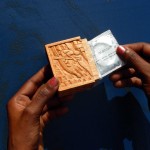
A pretty condom carrying box. By M. Sayagues
But for many others, it is not. Ads should target different segments. If we want to attract the attention of the young instead of totally turning them off, ads must be cool.
It is a fine balancing act. About three years ago, the South African anti-AIDS campaign LoveLife published a monthly insert in major newspapers, called Uncut that tried so hard to be blasé it was borderline pornographic.
There is a distance from acknowledging that young people have sex to portraying teens dressed like hookers in positions suggesting group oral sex. Many parents threw Uncut straight away. My daughter, aged 14 then and no prude, thought it cheapened girls.
After many complaints and public debate, Uncut changed. It went overboard. Now it reads like a church teen newsletter, wholesome and boring.
It may be that the terrifying scale of the AIDS pandemic in Southern Africa inhibits ad campaign planners and donors from portraying safe sex as fun. Maybe it is fear of offending churches, politicians and parents. And talking about sex has traditionally been taboo.
Yet, to get young people to practice safe sex, condoms must become part of their sexual paraphernalia and discourse. A bit of humour helps.
So have a laugh and tell us which is your favourite!
Ad selection courtesy of Chris Well, a designer and sexual rights activist at Conversations for a Better World. Check out his website for teens and reproductive health: www.15andcounting
I was very pregnant and very happy. I lived in Rome, Italy, and I wanted a home birth.
I wanted music, soft light, friends, baby on my [...]]]>

Safe motherhood for all. By F. Beaumont.
My daughter Esmeralda turns 18 today. Like all parents, I am amazed at how time flies. Like all mothers, I get reminiscent about those days, 18 years ago.
I was very pregnant and very happy. I lived in Rome, Italy, and I wanted a home birth.
I wanted music, soft light, friends, baby on my stomach still attached by umbilical cord, no drugs, and no epidural. A birth by my own rules, not by a cold hospital’s.
I found a group specialized in home births – Il Melograno. Their package included ob-gyn and midwife, courses, support and, more importantly, a woman-friendly feel. A photographer from Marie Claire magazine would do a photo reportage on my happy home birth.
Our premise: pregnancy is neither a disease nor a disability. Pregnancy and birth have become over-medicalized; women should reclaim it from doctors overly fond of control and caesareans. My family, my colleagues and the baby’s father thought I was crazy. Home births are more common now but women still battle to extricate pregnancy and birth out of the hospital realm.
In Brazil, we recently lost a battle for a centre for natural birth in Rio de Janeiro.
Clueless mommy
In my case, at midnight, after 30 hours of labour, I was stuck at 6 cms dilatation – and exhausted. A home birth must be 100 percent natural, so the few drops of oxitocyn to trigger full dilation had to be administered in hospital, three blocks away. There I went. At 2am my daughter was born – and promptly taken away to the nursery.
At 5:30am a nurse literally dumped my baby girl in my arms and left. No instructions on how to feed, nothing. My midwife and friends were coming at 8 am. What to do? I had never been around a newborn. I was like Carrie Bradshaw in Season 2 of Sex and The City – domesticity and motherhood were not part of my landscape.
So there I was, baby on one hand, baby book on the other, trying to figure it out. This is the most ridiculous and pathetic image of modern motherhood, I thought. How did we end here, from birth as a group event to 6 AM loneliness in hospital?
Less than 24 hours later, against hospital rules, I signed waivers absolving doctors of any responsibility and checked myself out.
I went home and turned on the CD player. My daughter’s godmother had been listening to the Rolling Stones: “You can’t always get what you want”. I chuckled.
Two close friends, one in Windhoek and one in London, recently tried a home birth but ended in hospital, just like me. Still, we were happy to go through labour at home.
Meanwhile, many women struggle to have a safe birth – anywhere. About half a million women die in childbirth very year. There are not enough trained midwives to ensure a safe labour, whether at home or at a clinic,

Art by Nelly Romeo Alves, photo by E. Zimbres
At a conference on reproductive health in Berlin last week, the World Health Organisation reported that one woman dies every minute for lack of adequate pregnancy and birth services.
A cruel paradox: the world proffers to revere motherhood but does not make it safe and comfortable for mothers to give birth.
]]>So what headlines have grabbed you lately about male circumcision in South Africa? These caught my eye:
“The death toll in the Eastern Cape’s winter circumcision season has risen to 31”
“Circumcision ‘scam’ probed”
“Two [...]]]>
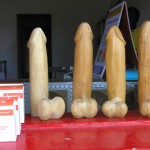
Hard task: defining sexual pleasure. Photo: M. Sayagues
So what headlines have grabbed you lately about male circumcision in South Africa? These caught my eye:
“The death toll in the Eastern Cape’s winter circumcision season has risen to 31”
“Circumcision ‘scam’ probed”
“Two on run after initiate dies”
As alarming and distressing as these headlines are – and the sad, desperate and greedy subtexts embedded in them – they don’t say much about the other big debate that is raging across southern Africa: the value of male circumcision to prevent HIV acquisition in heterosexual men, and what’s in it for women.
Well what’s in it for women is the topic du jour: Since observational studies had reported an association between male circumcision and reduced risk of HIV infection in female sexual partners, researchers in Uganda conducted an unblinded, randomised control trial to investigate this (Lancet July 2009) by circumcising some HIV positive men and not others. They found that circumcision did not reduce the risk of transmission to their female partners. So no luck there.
But what’s really getting gender activists of all genders to rise up from their sofas and comment on websites and chat rooms is the matter of sexual pleasure, and more specifically, the sexual pleasure of women.
What is sexual pleasure?
Now as a gay man I have to confess this is a topic that I have no personal experience of, but I am as interested in the notion of pleasure for my sisters of any sexual orientation as I am in mine.
I believe sexual pleasure should be a human right advanced to all, though for some of us this may be a progressive realisation of rights as we work through all the baggage of our socialisation!
I’m raising this issue because one of the many studies emerging as a companion to the now famous three circumcision trials, which showed the partial protective efficacy of male circumcision, suggests that “women whose male sexual partners were circumcised report an improvement in their sex life.”
Nearly 40% said sex was more satisfying afterward. About 57% reported no change in sexual satisfaction, and only 3% said sex was less satisfying after their partner was circumcised.
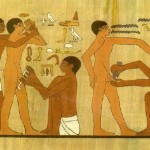
Ancient Egyptians get the snip.
Top reasons cited by women for their better sex life: improved hygiene, longer time for their partner to achieve orgasm, and their partner wanting more frequent sex, said Godfrey Kigozi at the Fifth International AIDS Society Conference on Pathogenesis, Treatment and Prevention of HIV in Cape Town recently.
Firstly, if you look at the data above, while 40% did say the sex was more satisfying, the majority in fact said there was either no change or it was less satisfying. Is the headline summary of the research accurate? Why do we need to spin this data?
Fluid and enigmatic
But really what’s vexed me, and others, is this notion of pleasure and how we define it. Those of us who come from a “social” as opposed to “biomedical” or “public health” paradigm would argue that sexuality is fluid, it changes over our lifetimes, it may be context or relationship dependent, it is informed not only by our gender but our class and orientation.
So “pleasure” in a sexual encounter may be shaped by mood, the time of life, the way a woman is relating to her partner that day, whether she was exhausted from chores, her beliefs about female agency in a sexual encounter, whether she was menstruating or in menopause, whether foreplay had occurred.
Pleasure, surely, is variable, contextual, dynamic, changing, unpredictable. Even enigmatic sometimes: a woman may have a good orgasm but still feel angry with her husband or partner. She may never have had an orgasm but feel happy that he does. She may secretly masturbate after he falls asleep and feel fantastic after that.
A biomedical or public health perspective, I would argue, reduces men and women and their practice to simple categories and distinct binaries: gay vs straight; masculine vs feminine; satisfied vs unsatisfied; safe vs dangerous.
This is necessary if you want a simplified view of the world and if you want “proof” that most women will be happy to have their male partners circumcised.
Who needs long and complicated qualitative research when a checklist with a choice of three options tells us all we need to know to placate those pesky social scientists with their doubts and ifs, buts and maybes? But how do you capture the nuances of satisfaction in a questionnaire?
You don’t. I think pleasure is much more complicated than that – and we need better and more interesting research to tease it out (as it were). What do you think?
Read more on controversial issues around male circumcision, sexual pleasure, human rights, viagra and condoms.
]]>I decided to visit my Nicaraguan friend who stays in a village called Fougamou, in central Gabon. So I looked up the nearest town, Lambaréné. It turned out to have a museum honouring Dr. Albert Schweitzer, who arrived there in 1913, built a hospital, and won a Nobel Peace Prize in 1952.
I [...]]]>
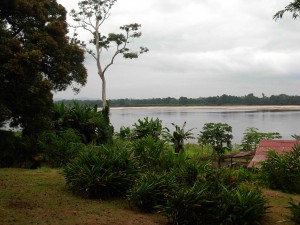
The Ogooué River seen from Dr. Schweitzer's home. Photo: M. Sayagues
I decided to visit my Nicaraguan friend who stays in a village called Fougamou, in central Gabon. So I looked up the nearest town, Lambaréné. It turned out to have a museum honouring Dr. Albert Schweitzer, who arrived there in 1913, built a hospital, and won a Nobel Peace Prize in 1952.
I had never been interested in him but it seemed like a truly off-the-beaten path museum, just my kind. But what sold me on Lambaréné was the name of its river: Ogooué. I HAD to see a river with such a wondrous name.
So I set off to Lambaréné on my way to Fougamou. Believe me, I was in the green heart of Africa. Green, as in rainforest.
I am glad I went. The river is awesome. The museum is charming. It preserves the old hospital and personal quarters from the 1920s as they were originally. Next is the modern hospital, which attends to 80,000 consultations and 6,000 hospitalized patients every year, and continues to practice what I believe was Schweitzer’s most creative medical idea: to welcome the African family, with place to wash, cook and sleep, in a hospital-cum-village.
True, the relatives provided – and still do – free labour. Also true, it is mostly women and girls who provide this free labour. In Gabon and elsewhere, caring for the sick and, increasingly, for the elderly, is women’s work.
In AIDS-ravaged Southern Africa, caring for the sick has put a burden on women and girls that is unthinkable to Western health consumers.
So huge, that the campaign Making Care Work Count lobbies governments for recognition and support of carers – who are subsidizing governments with their work, with little help, making up for woefully inadequate health budgets.
Notwithstanding the gender bias, to include the relatives in hospital design is much better than making them sleep on the street pavement, as I’ve seen in Luanda’s hospitals.
It also reflects a recognition that in Africa medicine must incorporate cultural and social meanings; that it can’t isolate the individual from the collective; that the meaning of disease is part of a bigger reality.
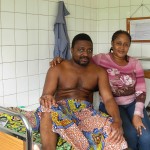
Yeyette and Joel Boko
I travelled from Libreville, 300 kms away, in a taxi-brousse. The first to get in was with Yeyette Boko. She was worried to tears about her husband, Joel Boko, who was in Lambaréné being treated for an ulcerous thigh. He needed a graft. So Yvette had wrestled a two-week leave from her employer to be with him.
She breezed into his room: “Mon chéri, I missed you so much!” They snuggled on the bed and called their four-year-old son, who was staying with an aunt in the capital.
Next day I visited again. Yeyette had cooked a hearty meal. He seemed stronger. They looked happy.
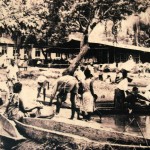
The old landing by the hospital-village.
Read about worldwide efforts to measure and pay women’s unpaid care work
]]>Technorati Profile
Their [...]]]>
Technorati Profile
Their pre-nuptial agreement stipulates that he will spend five days a month with her in her village and the rest with his first wife, who will get 80 per cent of his modest salary.
 The newly weds: a polemic union. Photo:Mukhtar Mai Women’s Welfare Organisation |
Nice sisterhood touch – weird nonetheless. Mai says she married because he was threatening to commit suicide if she didn’t. Her marrying a polygamist dismayed women activists in Pakistan. To me, the mind-boggling issue is the union to an obsessed man. In many countries, that threat would earn him a restraining order and psychotherapy. Here, it earns him a wife.
The heroine who refused to be a victim of her rapists submits to emotional blackmail. Her lawyer says Mai sought an alliance with a man of a powerful tribe, because the trial of her rapists is floundering. On the plus side, that a raped woman finds a husband who cherishes her is groundbreaking in Pakistan.
The truth will emerge sooner rather later, the reasons why this courageous activist, who runs her own NGO and had the support of the women’s movement in Pakistan, who starred in a documentary, wrote a memoir published in English and French, was Glamour magazine’s Woman of the Year and spoke at the United Nations, chose this marriage.
He is clearly smitten with her. She does not mention loving him, only family (his and hers) pressure. I’d like to ask her: do you love him, or think you may grow to love him, or is love for your husband a consideration at all? Maybe not. Romantic love is a social and cultural construct. Arranged marriages can grow strong, respectful and loving bonds among spouses. We wish the newly weds well.
Time will tell if five days a month is enough, too little – or too much.
This curious episode highlights how, for many women across the world, marriage is the only way she can feel safe, respected, provided with a roof over her head. The ways of the heart are mysterious and manifold; so are gender relations.
]]>